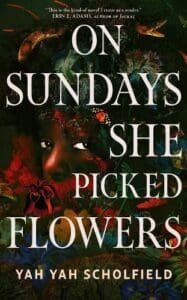
Synopsis:
When Springville residents—at least the ones still alive—are questioned about what happened on prom night, they all have the same explanation … Maddy did it.
An outcast at her small-town Georgia high school, Madison Washington has always been a teasing target for bullies. And she’s dealt with it because she has more pressing problems to manage. Until the morning a surprise rainstorm reveals her most closely kept Maddy is biracial. She has been passing for white her entire life at the behest of her fanatical white father, Thomas Washington.
After a viral bullying video pulls back the curtain on Springville High’s racist roots, student leaders come up with a plan to change their host the school’s first integrated prom as a show of unity. The popular white class president convinces her Black superstar quarterback boyfriend to ask Maddy to be his date, leaving Maddy wondering if it’s possible to have a normal life.
But some of her classmates aren’t done with her just yet. And what they don’t know is that Maddy still has another secret … one that will cost them all their lives. “
Review:
My first thought when I heard about a modernized retelling of Stephen King’s Carrie, was that it was far to soon to be retelling Stephen King. Then I realized that this year Carrie turns fifty. Then I sat with my feelings for a while.
Tiffany D. Jackson pulls off this trick of updating an established classic with several impressive moves. First has to do with making the story more contemporary. While it does take place in a twenty-first century setting complete with cell phones and social media, it’s also set in a southern town that is, in most ways, stuck in the past. Here, the town is still rigidly segregated by race, as is prom, with a white prom at the country club and the Black prom just down the street at an old converted barn.
Kenny, the local football god, sits uncomfortably between these two worlds, but it’s Maddy Washington who is really adrift. Passing as white for her entire childhood, she has also been indoctrinated by her white father into a cartoonish, Golden Age version of American history, with Grace Kelley and Leave it To Beaver as essential cultural touchstones (Insert jokes about Florida education laws here). Maddy lives in a past that, if it ever existed, had already faded away by 1974, when King published Carrie, so it’s not just telekinesis she has to educate herself on, but also the true history of anti-Black racism. In The Weight of Blood, these two ideas are intricately entwined.
It’s worth noting that putting race front and center is especially important as a response to King’s work, a sprawling oeuvre that has dealt with race in, let us say, troubling ways. From an early reliance on “magical negro” types to a rather blandly liberal (derogatory) portrait of Blackness, King hasn’t had the strongest track record on the subject. Imagining Maddy’s curse as being (apparently) related to her Blackness is a bold move.
This focus on racism actually makes certain elements of the narrative read clearer than in the original. King’s bullies are almost always psychopathic, and there’s little time spent on understanding their motivations. Here, when Jules decides to destroy Maddy, the stakes have been raised well beyond missing out on prom (she’s also has her college acceptance revoked), but more importantly, there is a long tradition of just such violent retribution in Springville. Just witness the lynching tree standing at the edge of town.
It does feel as if Maddy’s high school experience is significantly more pleasant than Carrie White’s, and there’s a great deal more time spent on a burgeoning romance between she and Kenny, her prom date, and there’s even an argument to be made that Jackson blinks at the end, offering some possibility of a happy ending, but these seem like minor issues. It’s the depth of reimagining that’s the star here, right down to the podcast interviews and book excerpts that run parallel to the main narrative. Character and conception carry the book.
I did occasionally have one thought: How does this book read for someone who is unfamiliar with Carrie? I don’t know the answer, but as the book has been marketed as YA, the chances seem fairly high that that’s exactly how it will be read. I think something is lost without that intertextual conversation, but if this is the next generation’s version of Carrie, we could certainly do worse.








Leave a Reply